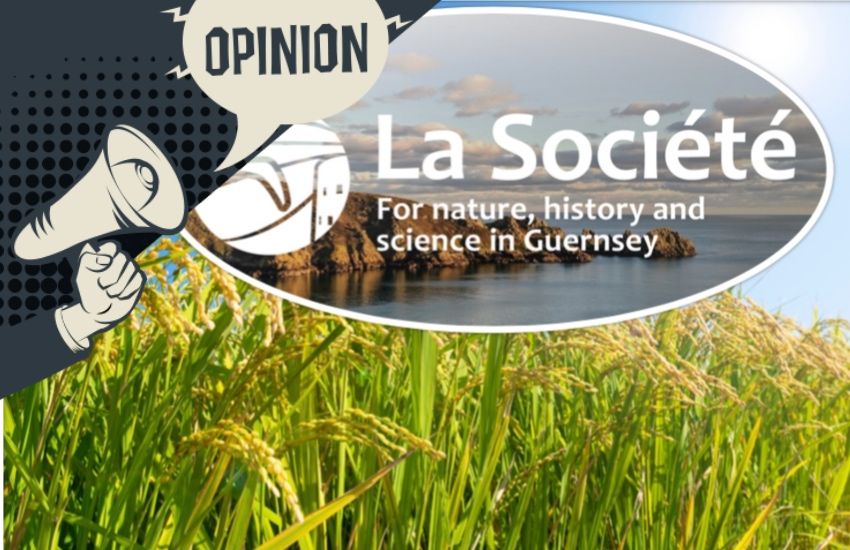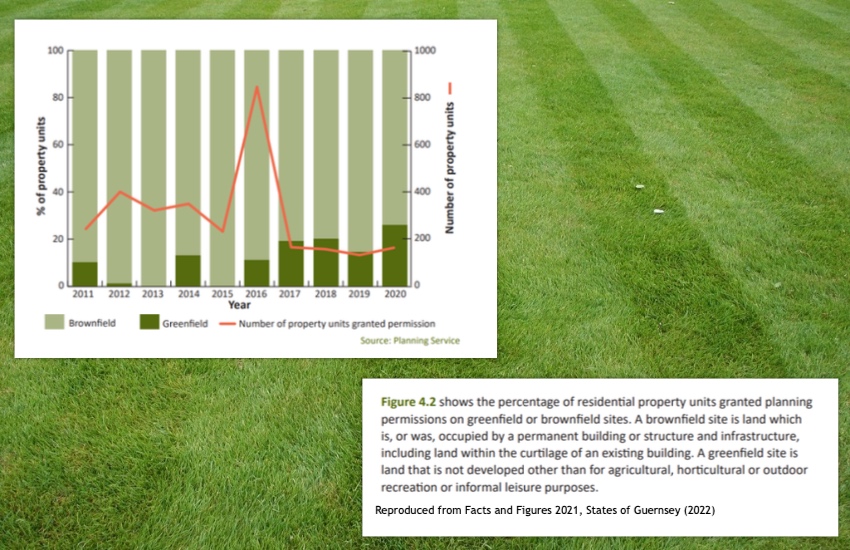


La Société Guernesiaise is of the opinion that there should be a moratorium on further loss of agricultural land to domestic curtilage and particularly of the development of green field sites.
On a small island with fragile ecosystems, regularly interrupted supply chains, and finite land, it is important that land use is managed at a landscape scale, and we carefully consider how our land is safeguarded for the needs of present and future generations.
At a time where the combined threats of climate change and biodiversity loss are encouraging jurisdictions across the world to protect their natural land, here in Guernsey the speed at which green land is being lost is increasing, as the data from the most recent Facts and Figures booklet demonstrates.

The development of green fields is being actively encouraged by the States of Guernsey through the publishing of Development Frameworks, such as that recently released for two fields at Pitronnerie Road despite not being earmarked for housing in the Island Development Plan.
And, more recently, the publication of an intent to develop fields behind Castel Hospital. A proposal which La Société were pleased to see Policy and Resource distance themselves from.
As an island, we are often presented with a dilemma – we can either have fields or we can have sufficient housing to meet our needs. La Société do not believe that this is the case, especially with an abundance of brownfield sites and derelict buildings around the island. We wish to encourage the States of Guernsey and local developers to give this difficult problem more consideration, rather than just simply building on green field land – this is not a sustainable solution.
In 2021 the Development and Planning Authority adopted a ‘Biodiversity Net Gain’ approach to the conversion of land, but we don’t believe this is enough to prevent harm to our natural environment.
The spread of gardens has been measured through successive habitat surveys of the island and has, in many instances, led to the loss of important habitats and associated wildlife. For example, species-rich grasslands have declined from 446ha in 1999 to 93ha in 2018. Much of the loss has been caused by intensive management.
Whilst certain agricultural practices can also cause harm to the environment, the conversion of large areas of the islands countryside to gardens is not likely to lead to an increase in biodiversity as many gardens are intensively managed. They are often planted or sown with non-native plants which at best will provide some shelter or food for local species, but at worst may become invasive leading to wide reaching environmental implications (such as Japanese knotweed or sour fig).
The loss of agricultural land may also lead to increasingly intensified management of the land which remains available to the dairy industry. Landowners are often willing to pay large sums for fields if it can be subsumed into their curtilage thus driving up the cost of agricultural fields. As most dairy farmers rent large proportions of their grazing land, this in turn will mean farmers need increase their yields to offset this cost and so are often forced to increase their inputs and introduce more intensive practices.
Whilst many current agricultural practices are damaging to the environment, farms such as the RSPB’s Hope Farm have shown that it is possible to farm with nature. We believe Guernsey can have both a thriving dairy industry and a biodiverse countryside – but only if there is sufficient land to allow these management practices to be introduced.
Once an area has been brought into curtilage, the area is then open to applications for sheds, garages etc and may even lead to substantial building works. It can also lead to further developments which do not require planning permission, such as the installation of swimming pools. This can have consequences for the biodiversity of the site, and any archaeology which may be hidden beneath.
La Société wish to encourage the DPA to reconsider their policy on the loss of agricultural land, and to prevent the further loss of the countryside to domestic curtilage.